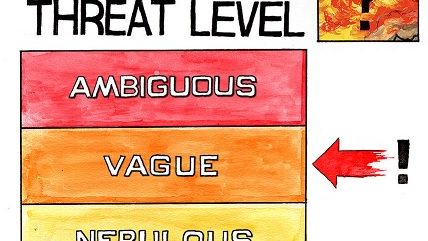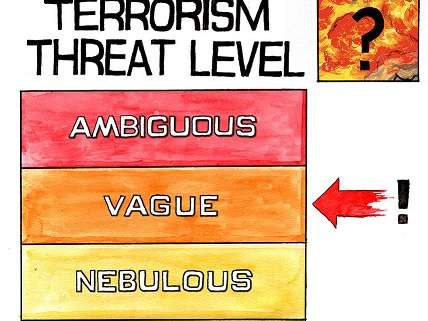Stupid Tax Laws, Stupid Gun Laws, Stupid Terrorist Laws Threatened Non-Violent Florida Man With 20 Years in Jail
Feds wanted to tack 20 years onto the sentence on tax and gun charges of an Islamic scholar for the books in his library.


An Islamic scholar from Florida named Marcus Robertson was charged and convicted of tax fraud and possession of a gun by a convicted felon and sent to jail in 2011. Since then, the federal government has sought a "terrorism sentence enhancement" that would keep Robertson in jail for 20 years for the crimes of not giving the government all the money the government demanded from him, and seeking to exercise his Second Amendment right after previously having been convicted of a felony—crimes that, at their heart, are non-violent.
Where did the attempted terrorism enhancement come from? The books Robertson was reading. The Intercept reports:
Robertson's case attracted national attention after prosecutors attempted to argue earlier this year that the contents of his book collection constituted evidence of his connection to terrorism. Prosecutors singled out roughly 20 titles from the more than 10,000 e-books Robertson owned, highlighted a selection of controversial passages, and used that to argue that he should be sentenced as though he were a terrorist.
None of Robertson's charges — conspiracy to file a false tax return and possession of a firearm by a convicted felon — were terrorism offenses.
Thankfully, this particular federal judge had some sense, and pointed out the federal government hadn't produced any evidence Robertson actually read the controversial passages, and that even if he had, it would not be unusual for a scholar to have among his read works, extremist material. I would go one further—even if you're not a scholar in a country that says you have a right to free speech and to be secure in your persons, properties, and papers, that what you read and why is none of the government's business and certainly no crime, no matter what it is.
I once owned a copy of Sayyed Qutb's Milestones, which I bought in a small Islamic store in Newark, N.J. The first store I went into said it did not have the book and would not sell it because it was a "bad book," but referred me to another store that did have it, hidden behind other books. The book was available to buy online but I didn't want an online record that I had purchased it. I lent it out to a reporter who is actually now at The Intercept. If the government knew I read the whole thing, I shouldn't have to be an Islamic scholar to avoid a sentence enhancement if I were convicted of some stupid law on the books the people demanded for safety or fairness or whatever.
After the mass shooting at a historically black AME church in Charleston, S.C., much ado was made about whether or not the incident qualified as terrorism. The Intercept's Glenn Greenwald wrote about how the refusal of authorities to call the act of terror a terrorist act showed that the term "terrorism" was a meaningless propaganda term. But not quite meaningless, as Greenwald points out and the story of Robinson illustrates, because of the legal infrastructure built around it. But, wrote Greenwald:
Perhaps the only way people will start to see that [terrorism is a meaningless term that justifies everything], or at least be bothered by it, is if it becomes clear that not just marginalized minority groups but also their own group can be swept up by its elasticity and meaninglessness. There is ample resistance to that, which is why repulsive violence committed by white non-Muslims such as yesterday's church massacre is so rarely described by the term. But that's all the more reason to insist on something resembling fair and consistent application.
But because the term "terrorism" isn't meaningless so much as it is actually a powerful word with the ability to make it easier for the political class to crush civil rights while "the people" cheer on, I question the wisdom of wishing more people to be identified as such. I understand the sentiment behind wanting to see someone like Dylann Roof, the Charleston shooter, treated like a terrorist. He terrorized people, and not just the people in the church that day but around the country. But the stakes are too high to give in to our base desire for vengeance masked as fair justice. Roof committed a number of crimes, most of which carry the death penalty in South Carolina, and federal prosecutors are not expecting any difficulty in prosecuting him. Similarly, alleged Islamic terrorists ought to be charged with the crimes they're alleged to have commited, not nebulous "terrorism" add ons.
Do we want to give federal prosecutors more tools to go after someone who might have literature considered Islamist extremist, neo-Confederate, or even black nationalist, and has found themselves in the crosshairs of the most powerful government on the planet? Do we want more cases like Robinson's, so long as the government's victims are of all races? As many liberties as we've lost since 9/11, if we welcome the idea that every crime that scares us, that terrorizes us, is an act of terrorism that demands a response like the U.S.'s response to 9/11 (something even Jon Stewart suggested on a recent episode of The Daily Show), we've got that many more liberties to lose.


Show Comments (21)